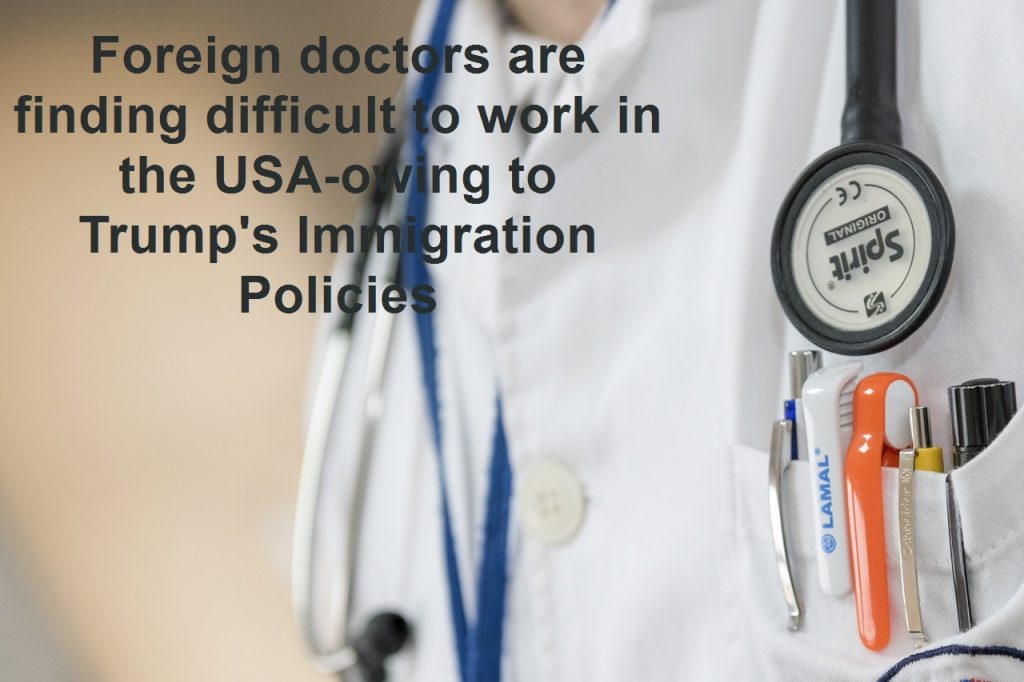Doctors and the hospital system are the new victims of Trump’s immigration policy. Changes in the policy leave doctors and practitioners bounded to practice in the USA. In the course of the ongoing shortage of the medical practitioners, these changes have left health care unattended. Let’s understand why Foreign doctors are finding difficult to work in the USA-owing to Trump’s Immigration Policies
Executive order of the President- Buy American and Hire American- Indian Doctors getting Jobless in USA
U.S citizenship and immigration services lately to comply with the executive order issued by the president- BUY American and Hire American, is sending RFEs that request for evidence to many of the H-1B holder employers. H-1B holders have filed the application for the resident matching. USCIS when asked said to the Bar that he will continue sending the RFEs if any of the petitioner’s application lack evidence. The main objective is to ensure proper working culture to the US employers.
The policy is just to intimidate foreign doctors and system in USA
A foreigner doctor from Israel, Daniel an H-1B holder practicing medicine in the US from past 4 years, is receiving visa’s rejection because he is unable to produce enough proofs that are demanded by the USCIS.
At the depth of the issue
According to the USCIS resident stipend he has been mention in his application, he has been using the same for last four years. This results in speculation and USCIS demanded RFEs for producing more specific data regarding the same.
Daniel, on his part unable to produce the data because for the resident physician that data doesn’t exist. Further added that he didn’t expect something like this for the medical practitioner who has been working day and night for the past four years. Now the timeline given to him is 30 June to present the data. Failing to do so he has to return back to his country Israel, leaving his dream and practice behind in the USA.
Facts and figures to show the downturn in filling the application of residency by Doctors in USA match-
Similar to the visa rejection of Daniel, many H-1B holder’s application has been rejecting which results in more speculations by the hospital system. As per the data by Main Residency Match 2018, this year experienced the lowest number of applicants registering for residency match.
According to the president Dr. William Pinsky of Educational Commission for Foreign Medical Graduates (ECFMG) which certification to the doctors, the fall in the number of applicants is observed to be from the countries that were included in the Trump’s travel ban list of 2017. Around 8000 doctors from the banned countries are working in the USA. Dr. pinksy further added that year 2017 experience around 18% fewer doctors applied to receive certification.
Other countries too have medical opportunities same as the USA- but Doctors tend to prefer USA- may be for better life
Sanaz Attaripour-Isfahani is also from Israel and completing her fellowship from the USA, is very much aware of this fact. But she has no regrets about fighting a 5 year long battle for residency in the USA. But he sister who is also a doctor in Iran has different thoughts as she opted Canada for her residency considering fighting for the residency is not worthy.
The major shift of the medical graduates to other countries like U.K, Europe, and Canada
Dr. Yusuke Tsugawa of David Geffen School of Medicine, University of California Los Angeles, after studied medical graduate came to the conclusion that many international students are shifting to the other countries largely because of the uncertainty of the near future. No one is ready to risk his training in the middle of its completion that could have an adverse effect on their careers.
Who could be affected the most due to US Immigration Policy on Doctors
If data are seen every eighth of the residents is from a foreign country. The US healthcare system is to be badly affected because of the shortage of the physicians. Estimations have been made by American College of Physicians that between 40,800 and 105,000 physicians are going to short by 2030.
U.S native medical graduates abstain themselves from certain areas and fields. Rather than this, they prefer highly paid areas such as dermatology, surgery. But international medical graduates provide their service in Underserved areas that are rural ones. Unlike US native graduates they chose primary care and family medicine as their major fields.
Scrupulous selection criteria are responsible for the shortage of international graduates-
Observation by Dr. Yusuke Tsugawa reveals that 94% of U.S graduates are selected for the training after clearing the residency match. But only 56% of the international students cleared the residency match owing to the strict selection criteria.
Agreeing to Dr. Yusuke Tsugawa, Dr. Anupam Jena, of Harvard Medical School, further added that the system is made to select the best from around the world irrespective of their country. U.S medical schools quality is no less than any other school of any other country.
What happens to those who are ready to take risk of hiring international graduates not meeting the criteria
Small hospitals that are running programs in the underserved areas are not taking up the risk of hiring international medical graduates who don’t meet the required cut as they can’t afford the absence of one or two from the group.
Some schools who have to dare to hire such international foreign students not meeting the cut are to be punished in near future. This forced various medical schools to write to the USCIS saying that on an average for one program about 60% of the graduates are from other countries. Nothing can be said about the uncertainty that is prevailing. We even can’t think of the programs that are small-scale aiming at primary care and family medicine in the underserved areas without any of that graduate.

